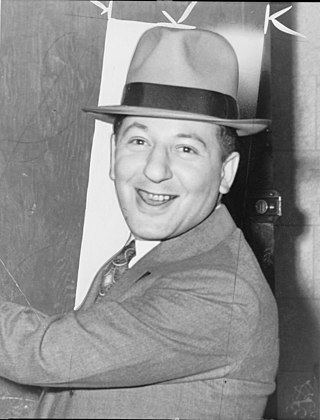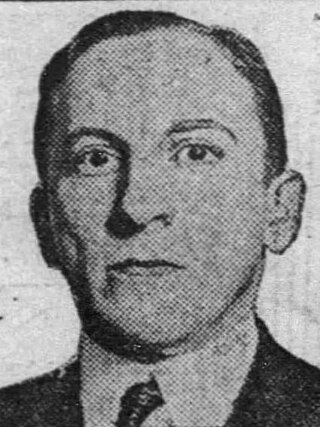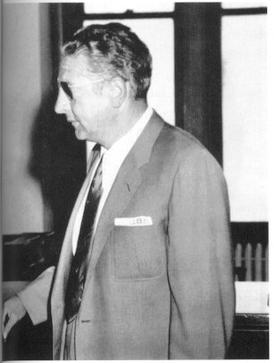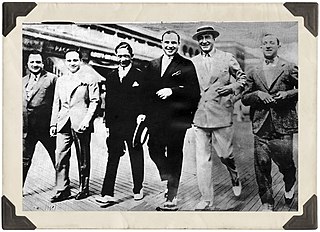
Charles "Lucky" Luciano was an Italian-born gangster who operated mainly in the United States. Luciano started his criminal career in the Five Points Gang and was instrumental in the development of the National Crime Syndicate. Luciano is considered the father of modern organized crime in the United States for the establishment of the Commission in 1931, after he abolished the boss of bosses title held by Salvatore Maranzano following the Castellammarese War. He was also the first official boss of the modern Genovese crime family.

Benjamin "Bugsy" Siegel sometimes known as Ben Siegel, was an American mobster who was a driving force behind the development of the Las Vegas Strip. Siegel was influential within the Jewish Mob, along with his childhood friend and fellow gangster Meyer Lansky, and he also held significant influence within the Italian-American Mafia and the largely Italian-Jewish National Crime Syndicate. Described as handsome and charismatic, he became one of the first front-page celebrity gangsters.

Meyer Lansky, known as the "Mob's Accountant", was an American organized crime figure who, along with his associate Charles "Lucky" Luciano, was instrumental in the development of the National Crime Syndicate in the United States.

Frank Costello was an Italian American crime boss of the Luciano crime family. In 1957, Costello survived an assassination attempt ordered by Vito Genovese and carried out by Vincent Gigante. However, the altercation persuaded Costello to relinquish power to Genovese and retire. Costello died on February 18, 1973.

Louis Buchalter, known as Louis Lepke or Lepke Buchalter, was an American mobster and head of the Mafia hit squad Murder, Inc., during the 1930s. Buchalter was one of the premier labor racketeers in New York City during that era.
The National Crime Syndicate was a multi-ethnic, closely connected, American confederation of several criminal organizations. It mostly consisted of and was led by the closely interconnected Italian American Mafia and Jewish Mob. It also involved other criminal organizations such as the Irish Mob and to a lesser extent African American groups. Hundreds of murders were committed by Murder, Inc. on behalf of the National Crime Syndicate during the 1930s and 1940s.

Arnold Rothstein, nicknamed "The Brain", was an American racketeer, crime boss, businessman, and gambler who became a kingpin of the Jewish Mob in New York City. Rothstein was widely reputed to have organized corruption in professional athletics, including conspiring to fix the 1919 World Series. He was also a mentor of future crime bosses Lucky Luciano, Meyer Lansky, Frank Costello, Bugsy Siegel, and numerous others.
The Havana Conference of 1946 was a historic meeting of United States Mafia and Cosa Nostra leaders in Havana, Cuba. Supposedly arranged by Charles "Lucky" Luciano, the conference was held to discuss important mob policies, rules, and business interests. The Havana Conference was attended by delegations representing crime families throughout the United States. The conference was held during the week of December 22, 1946, at the Hotel Nacional. The Havana Conference is considered to have been the most important mob summit since the Atlantic City Conference of 1929. Decisions made in Havana resonated throughout US crime families during the ensuing decades.
Organized crime was particularly active in its heyday of the 1950s. The year 1951 saw a number of notable organized crime events, including the conviction of mobster Mickey Cohen for tax evasion.

Thomas Gaetano Lucchese, sometimes known by the nicknames "Tommy", "Thomas Luckese", "Tommy Brown" or "Tommy Three-Finger Brown" was an Italian-American gangster and founding member of the Mafia in the United States, an offshoot of the Cosa Nostra in Sicily. From 1951 until 1967, he was the boss of the Lucchese crime family, one of the Five Families that dominate organized crime in New York City.

Jewish-American organized crime initially emerged within the American Jewish community during the late 19th and early 20th centuries. In media and popular culture, it has variously been referred to as the Jewish Mob, the Jewish Mafia, the Kosher Mob, the Kosher Mafia, the Yiddish Connection, and Kosher Nostra or Undzer Shtik. The last two of these terms are direct references to the Italian cosa nostra; the former is a play on the word for kosher, referring to Jewish dietary laws, while the latter is a calque of the Italian phrase 'cosa nostra' into Yiddish, which was at the time the predominant language of the Jewish diaspora in the United States.

The Atlantic City Conference held between 13–16 May 1929 was a historic summit of leaders of organized crime in the United States. It is considered by most crime historians to be the earliest organized crime summit held in the US. The conference had a major impact on the future direction of the criminal underworld and it held more importance and significance than the Havana Conference of 1946 and the Apalachin meeting of 1957. It also represented the first concrete move toward a National Crime Syndicate.

Paul John "Frankie" Carbo was an Italian-American New York City Mafia soldier in the Lucchese crime family who operated as a gunman with Murder, Inc. before transitioning into one of the most powerful promoters in professional boxing.

Waxey Gordon was an American gangster who specialized in bootlegging and illegal gambling. An associate of Arnold Rothstein during prohibition, he was caught up in a power struggle following Rothstein's death. Fellow Rothstein associates Charles "Lucky" Luciano and Meyer Lansky provided authorities with evidence that led to his imprisonment for ten years.

John T. Scalish, also known as "John Scalise", was an Ohio mobster who became the boss of the Cleveland crime family. His death resulted in the ascension of James T. Licavoli to the head of the Cleveland Mob and to a bloody gang war that would essentially destroy the once-powerful crime family that Scalish had helped to develop.
Harry Tietlebaum or Teitelbaum was an American organized crime figure in New York's underworld during Prohibition as he was associated of the Bug and Meyer Mob. He was later part of a major heroin smuggling operation with Meyer Lansky and Harry "Nig" Rosen during the early 1930s.
The Lucchese crime family's New Jersey faction, also known as the Jersey Crew, is a powerful crew within the Lucchese crime family. The members operate throughout the Northern New Jersey area. During the 1970s into the late 1980s, the crew was led by Anthony Accetturo and his protégé Michael Taccetta. In 1987, Victor Amuso took over the family and began demanding a higher percentage of tribute from the crew. Accetturo refused and a war erupted between the New Jersey members and the New York members. This left brothers Michael and Martin Taccetta in charge of the crew as they tried to have Accetturo and his family murdered. In 1993, Accetturo defected and became a government witness. He helped convict Michael and Martin Taccetta. The crew was most recently controlled by Ralph Perna.
Jacob "Yasha" Katzenberg was an organized crime figure in New York who supplied narcotics to mobsters including Charles "Lucky" Luciano, Waxey Gordon, Charles "King" Solomon, Harry "Nig" Rosen, the Torrio–Capone organization as well as mobsters in Detroit, Kansas City and St. Louis.

Nucky Johnson's Organization was a corrupt political machine based in Atlantic City, New Jersey that held power during the Prohibition era. Its boss, Enoch "Nucky" Johnson, coordinated the Organizations's bootlegging, gambling, racketeering, and prostitution activities.











